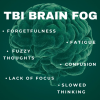Self-monitoring is described as the ability to evaluate and observe your behaviors from others, and is considered an executive functioning skill (higher-level thinking skill). It allows you to compare your behaviors against the social norms and adapt your behavior accordingly to the situation. Some people are naturally high self-monitors and are able to read the social cues of others better, compared to individuals that have low self monitoring skills and aren’t as observant. Furthermore, self-monitoring skills are necessary to change your behavior or actions to meet a desired goal. For example, it would allow you to assess your performance during an activity and decide if you need to change your behavior (or choose a different strategy) based on if your goal or purpose of the activity has been met. The figure below shows the characteristics of what it looks like to be a high or low self-monitor.
| High Self-Monitors | Low Self-Monitors |
|
|
Traumatic Brain Injury and Self-monitoring Skills
Frontal lobe damage affects an individual’s self-awareness skills which is an understanding of oneself, which leads to skills like being able to self-monitor yourself. Decreased self-monitoring skills (or decreased insight), can make it difficult to become aware of the effects their behaviors have on others, or having difficulties judging how appropriate their behaviors are. Therefore, it could become challenging to blend in social environments, create or maintain relationships, or become successful in accomplishing tasks.
Below are strategies on how to improve self-monitoring skills:
- Asking others for feedback so that you are aware of your behaviors
- Outline what needs to be done for a task to help you stay on track
- Create a visual reminder to stop, observe your actions or behaviors, and remember the goal of the task or the behaviors that are appropriate for the social setting. Are your behaviors aligned with them?
- Reading social stories or videos to learn about the appropriate behaviors for different environments
References:
Ylvisaker, M. (2006). What is self-monitoring? LEARNet: A Resource for Teachers, Clinicians, and Students, by the Brain Injury Association of New York State. http://www.projectlearnet.org/tutorials/self-monitoring.html
Psychology Campus (n.d.). Self-monitoring. Psychology Campus. http://www.psychologycampus.com/social-psychology/self-monitoring.html.
Kennedy, M. R. T., Coelho, C.,Turkstra, Ylvisaker4, L. T., Sohlberg, M. M., Kathryn, Y., Chiou, H. & Kan. P. (2008). Intervention for executive functions after traumatic brain injury: A systematic review, meta-analysis and clinical recommendations. Neuropsychological Rehabilitation, 1-43. https://doi:10.1080/09602010701748644.



